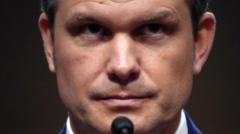In a tense and politically charged atmosphere, Pete Hegseth, nominated by former President Donald Trump for the position of defense secretary, underwent a grueling confirmation hearing before the Senate Armed Services Committee. Lasting over four hours, the session marked an important step in Hegseth's path to potentially managing the extensive Defense Department, charged with overseeing about three million employees and a staggering $849 billion budget.
From the outset, Hegseth, a military veteran, stressed the value of a "warrior ethos" within the Pentagon, stating his goal was to revitalize America’s military capabilities. He asserted, "Warfighting, lethality, meritocracy, standards, and readiness. That's it. That is my job." Hegseth was particularly vocal in his opposition to policies promoting diversity, asserting that they negatively impacted military effectiveness. "This is not a time for equity," he iterated, opposing any inclusion guidelines he believed undermined morale.
The hearing featured pointed exchanges, especially as Democratic senators like Kirsten Gillibrand, Mazie Hirono, and Elizabeth Warren questioned Hegseth over his notably contentious past statements regarding women's roles in military combat positions. This segment led to some of the most intense moments of the hearing, especially when Warren confronted Hegseth with a direct quote from a podcast in which he expressed skepticism about women serving in combat. Hegseth, unfazed, framed his argument as a commitment to maintaining military standards.
Hegseth's relative youth at age 44 would make him one of the youngest defense secretaries to serve, and he attempted to position his limited experience as an advantage. He characterized himself as a "change agent" and was met with affirmation from some Republican Senators, including Eric Schmitt, who praised his fresh perspective untainted by conventional Washington norms. However, Democrats, including Senator Tammy Duckworth, drilled down on his lack of administrative experience, emphasizing their concerns over his capability to lead such a vast department.
Unexpectedly, the hearing saw a striking deficiency in discussions regarding critical military issues—the broader complexities facing the Defense Department, including current geopolitical tensions involving China and the ongoing situation in Ukraine. Experts noted that significant questions about threat assessments and military strategy were pushed aside in favor of inquiries into Hegseth's character and suitability for office.
Further complicating Hegseth's confirmation were resurfaced allegations of sexual misconduct from 2017, which he denied, framing them instead as part of a "coordinated smear campaign" orchestrated by adversarial media. Despite these controversies, he opted to highlight his Christian faith in discussions about personal accountability, suggesting a desire for redemption rather than dwelling on past missteps.
As the hearing concluded, the road ahead for Hegseth seemed fraught with obstacles, raising profound questions about his capacity to unify a divided Senate under the weight of a nation confronting multifaceted military challenges.





















